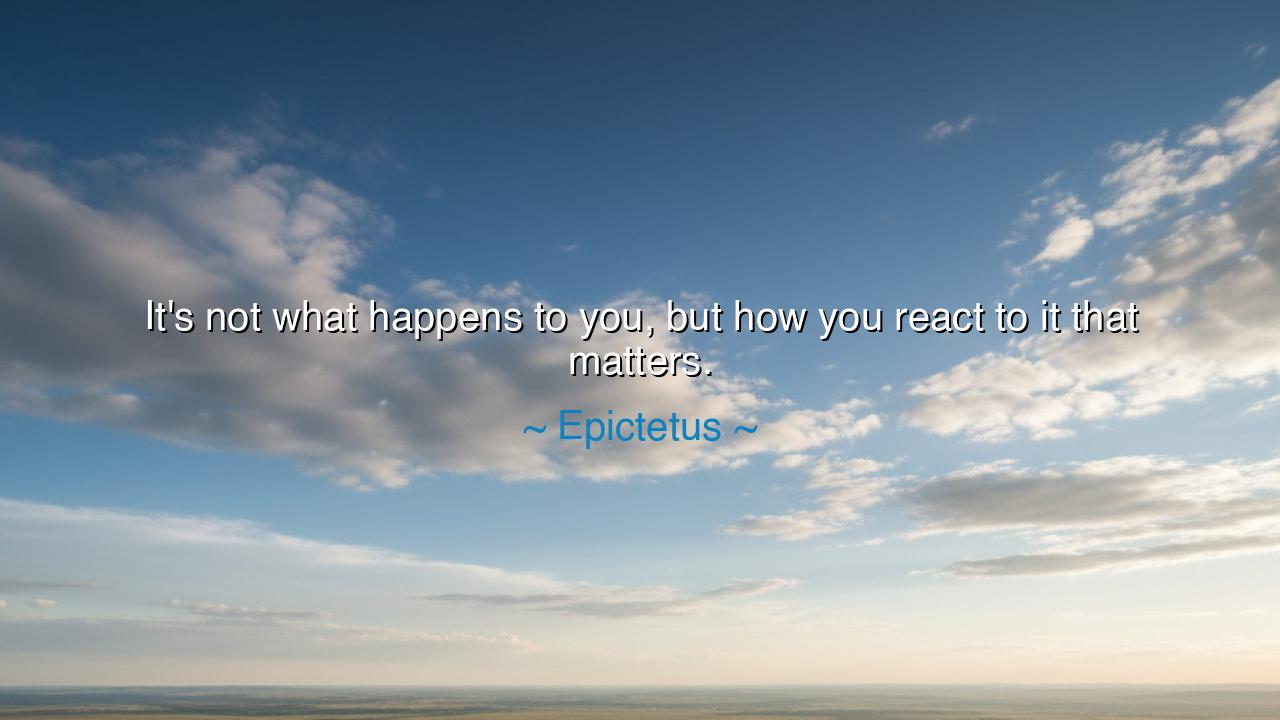
It's not what happens to you, but how you react to it that






O children of wisdom, hear the voice of Epictetus, the stoic sage, who speaks not of the world’s cruelty, but of the strength within us to rise above it. He declares, "It's not what happens to you, but how you react to it that matters." In these words lies the heart of the ancient teachings of stoicism, that we are not the victims of fate, but the masters of our own response. For the world may lash at us with its storms, but it is the spirit we summon in those moments of fury that defines us.
The essence of this wisdom is a call to inner strength—to fortitude in the face of hardship. The world will strike us down, challenge us, seek to break our spirit. Yet, it is not in the circumstances that our true nature is revealed, but in how we choose to face them. Will we cower before adversity, or will we rise, steadfast and unshaken, drawing strength from the very trials that seek to destroy us? The answer lies within the heart of each individual, and it is this response that shapes the course of our lives.
Consider the tale of Marcus Aurelius, the great Roman emperor, who, despite the constant wars and the betrayal of trusted men, chose to rule with wisdom and virtue. His empire was beset by enemies, yet he remained calm, centered, and unyielding in his belief in justice and the good of the people. Though his life was filled with suffering, he did not lament his fate. Instead, he embraced each challenge as an opportunity to cultivate his virtue, to refine his soul. He did not let the world's cruelty define him, for his strength lay in his response to the trials that life threw before him.
In this same way, look to Helen Keller, a woman who, from the moment of her birth, faced the overwhelming barriers of both blindness and deafness. Yet, she did not let these obstacles define her. Through sheer force of will and an unwavering belief in the power of the human spirit, she became one of the most influential voices for those with disabilities. It was not the handicap of her body that shaped her life, but her reaction to it—the strength she summoned to overcome the limitations imposed upon her. It is the spirit with which we meet life’s trials that reveals the true greatness of the soul.
So, O children, let it be known that life will bring its sorrows, its losses, and its challenges. Yet, it is not these things that shape us. It is how we react, how we stand in the face of adversity, that will define the legacy of our lives. In each moment of struggle, find your inner strength, summon the virtue within, and you shall rise, like the mighty oak, from the winds that seek to uproot you. For the power lies in you, and it is your response that shapes the world around you.






YKHwing Y kien
I appreciate this quote because it aligns with the idea that our mindset and reactions define us. But there’s also a part of me that feels like it could be dangerous if taken to an extreme. Could it lead to the belief that no matter how bad things get, it’s always up to us to stay positive? Can we allow ourselves to grieve, feel angry, or struggle without feeling like we’re failing to respond appropriately?
MNMinh Nghi
Epictetus's perspective is empowering because it places the responsibility for our emotional well-being on us. But it also makes me wonder—what if someone is going through a series of overwhelming, uncontrollable events? Can we still expect them to maintain composure and a positive reaction, or should we recognize that sometimes, the situation is too much to handle? How do we avoid being too hard on ourselves or others when things seem beyond our control?
THNguyen thi thu hai
This quote makes a lot of sense in terms of personal growth, but it also raises the question: what about the external factors that shape our ability to react? In a world full of stressors, social pressures, and injustices, can we really just choose how we respond, or are our reactions sometimes shaped by those external forces? How do we break free from negative influences and train ourselves to always react in a balanced way?
YBYumy Bela
I really like the idea behind this quote because it shifts the focus from external circumstances to personal responsibility. But at the same time, I wonder if it oversimplifies things. Can we always control our reactions, especially when faced with intense emotional situations? What if the event itself is so traumatic that it's difficult to respond rationally? Is it realistic to expect people to react calmly in every circumstance, or is that an ideal that’s hard to reach?